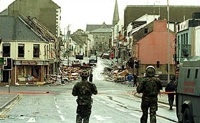
A committee of the Westminster parliament in London has criticised British prime minister Gordon Brown over his refusal to reveal what British military intelligence knew about the August 1998 Omagh bombing.
The ‘Northern Ireland Affairs Committee’ last week issued a report which concluded that questions remained about whether the bombing, which killed 29 people including a woman pregnant with twins, could have been “pre-empted”.
The British government has steadfastly refused to allow an inquiry into why close monitoring of the bomb failed to prevent the attack and also why telephoned warnings failed to clear the area before the blast.
Speculation has mounted in recent years that the resulting casualties were the product of a ‘black operation’ intended to kill off support for the breakaway ‘Real IRA’ in the critical months following the signing of the 1998 Good Friday Agreement.
The ‘Northern Ireland Affairs Committee’ -- consisting solely of British MPs -- last week issued a report at Stormont which called for a new inquiry, at least on the issue of why intelligence on the bombers was not passed on to investigating police detectives.
“If not, why not?” asked the committee’s Tory chairman Sir Patrick Cormack.
The committee’s report largely focused on a review of the use of intelligence intercept information carried out by the British intelligence services commissioner Peter Gibson.
His review was prompted by a BBC Panorama programme alleging serious intelligence failings over the Omagh bombing.
Mr Cormack complained that while a summary of Gibson’s report was released, the full classified document was kept secret in spite of repeated requests to the British prime minister.
The committee, which comprises cross-party members including MPs from the DUP, the Ulster Unionist Party and the SDLP, said “far too many questions” remained unanswered.
The committee sought a definitive statement on whether the names of those thought to have been involved were known to the intelligence services, Special Branch, or the RUC police in the days immediately after the bombing.
It asked the British government to justify the argument that the public interest was best served by keeping telephone intercepts secret. It called for a further inquiry into the bombing.
“There is a compelling case for some further inquiry into what did or did not occur in relation to Omagh, but whether a full-scale public inquiry is the proper route for that is less clear,” it reported.
Downing Street defended its decision not to release the Gibson report “on British national security grounds”.
“Obviously, when national security is involved, there can only be a limited number of people with whom that can be shared,” said a spokesman for Gordon Brown.
The families of those killed fear only a decades-long struggle akin to the Bloody Sunday campaign will reveal the full truth.
Michael Gallagher, whose 21-year-old son Aidan died in the bombing, welcomed the committee’s report but repeated his call for a full cross-Border inquiry into the bombing.
![[Irish Republican News]](https://republican-news.org/graphics/title_gifs/rn.gif)
![[Irish Republican News]](https://republican-news.org/graphics/title_gifs/harp.gif)

